Home » Diet & Food »
Avocados Contain WAY More Protein Than You’d Expect
When you first embark on a low-carbohydrate diet, it feels like freaking EVERYTHING has carbs—leading to a lot of Regina George-level questions. (Don’t worry: Butter is not a carb.)
Yes, it can be super confusing. But, in general, when building a high-protein, low-carbohydrate meal, fill half of your plate with non-starchy veggies (like leafy greens), a fourth with lean protein, and a fourth with whole grains or beans with healthy fats (like avocado or nuts), says Lauren Harris-Pincus, R.D.N and author of The Protein-Packed Breakfast Club.
“Add a few fruit servings per day and some low-fat dairy products, and your diet will be appropriately balanced and lower in carbs than the typical American diet,” she says.
Choosing the right types of carbs for your high-protein, low-carbohydrate diet is key. “If going low carb is important to you, make sure to use your carb grams wisely and pack in plenty of fruit, vegetables, whole grains, nuts, seeds, beans, and low-fat dairy,” she says. That way, you’ll still get a balanced amount of nutrients.
So, what are these high-protein, low carb foods you’ll want to stock up on? Dietitians share their top 30 choices:
1. Snacking Cheese
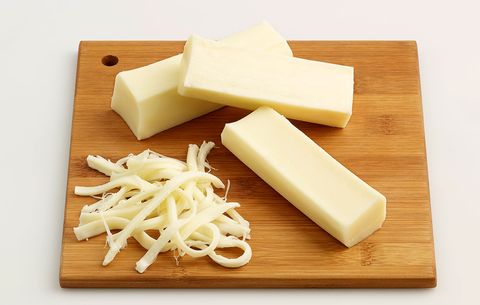
Getty Images
String cheese and Mini Babybel are Harris-Pincus’ go-to snacks. “Mini Babybel offers 100 percent real-cheese snacks in a convenient and fun little package. One creamy cheese round provides at least four grams of protein and zero grams of carbs for 70 calories or less,” she says.
Per cheese stick: 50 calories, 2.5 g fat (1.5 g sat), 1 g carbs, 0 g sugar, 160 mg sodium, 0 g fiber, 4g protein.
2. Pistachios
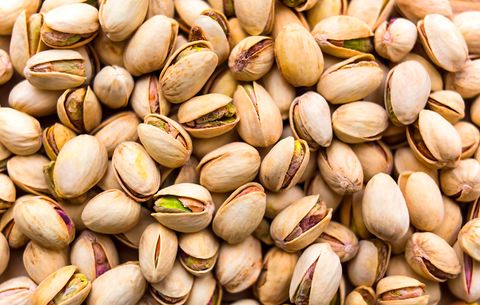
Getty Images
“Pistachios make an excellent snack, with 30 nuts providing only 100 calories and five grams of carbs,” says Harris-Pincus. These little nuts can also help aid weight-loss efforts.
Per 1/4-cup serving: 172 cal, 14 g fat (2 g sat), 8 g carbs (5 g net), 2.3 g sugar, 0 mg sodium, 3 g fiber, 6 g protein.
3. Fish
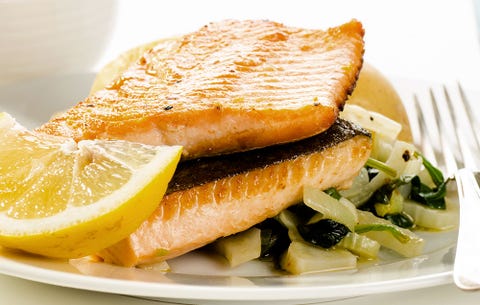
Getty Images
If you’re on a high-protein, low-carb diet, fish is your best friend. “Fish is a brain-healthy lean protein, and fatty fish in particular helps you get the essential omega-3 fatty acids that are important for healthy arteries, reduced inflammation, and a healthy brain,” says Maggie Moon, R.D.N. and author of The MIND Diet. And each serving generally has 15 to 20 grams of protein (depending on the fish), with zero carbs.
Per 3-oz serving (salmon): 177 cal, 11 g fat (3 g sat), 0 g carbs, 0 g sugar, 50 mg sodium, 0 g fiber, 17 g protein.
Try these lemon herb salmon kebabs:
4. Greek Yogurt
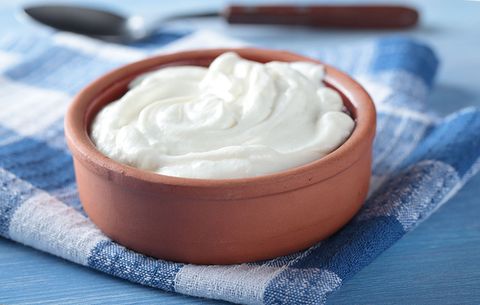
Getty Images
There are many lower-sugar Greek yogurts on the market now, some with just a touch of sugar and others sweetened with Stevia or monkfruit to keep the carb content down without use of artificial sweeteners, says Harris-Pincus. “On average, these yogurts range from 90 to 120 calories with 12 to 15 grams of protein, 11 to 15 grams of carbs, and some with higher fiber counts as well. Look for varieties containing nine grams of sugar or less, and add in nuts or berries for added fiber,” she says.
Per one 7-oz container (plain, low-fat): 146 cal, 4 g fat (3 g sat), 8 g carbs, 7 g sugar, 68 mg sodium, 0 g fiber, 20 g protein.
5. Ricotta
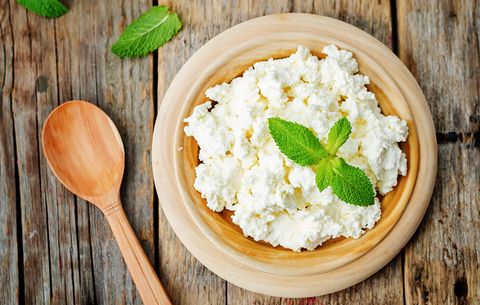
Getty Images
Per the USDA, a half-cup serving of low-fat ricotta has 14 grams of protein and six grams of carbs, making it a great low-carbohydrate, high-protein food.
If you don’t eat dairy, though, don’t fret. Plant-based cheeses are a unique way to add protein and healthy fats to the day. “Ricotta made from almond milk, using traditional cheese-making methods, has nine grams of plant protein per three ounces, and is completely plant-based, and therefore cholesterol-free,” says Moon.
Per 1/2-cup serving (part-skim): 171 cal, 10 g fat (3 g sat), 6 g carbs, 0.4 g sugar, 123 mg sodium, 0 g fiber, 14 g protein.
6. Eggs
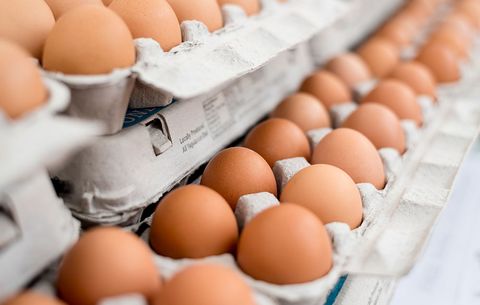
Getty Images
One large egg is enough to provide a good source of hard-to-get vitamin D, which can improve bone and tooth health, says Moon. “It also provides an excellent source of choline (20 percent daily value), an under-recognized nutrient important for memory,” she says. Try making eggs for a high-protein, low-carbohydrate breakfast.
Per one whole, large egg: 72 cal, 5 g fat (2 g sat), 0.4 g carbs, 0.2 g sugar, 71 mg sodium, 0 g fiber, 7 g protein.
7. Avocado
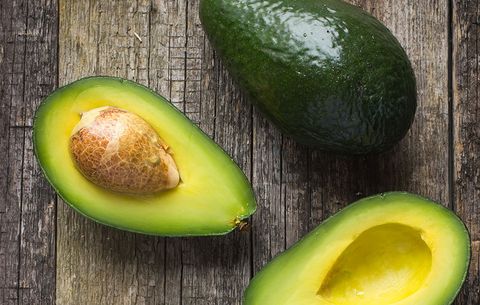
Getty Images
“Avocado is a nutrition powerhouse,” says Harris-Pincus, thanks to its high amount of fiber and heart-healthy monounsaturated fats. “For a low-carb snack, roll up a slice of avocado in a piece of deli turkey,” she says.
Per avocado: 322 cal, 29 g fat (4 g sat), 17 g carbs (3 g net), 1 g sugar, 14 mg sodium, 14 g fiber, 4 g protein.
8. Cow’s Milk
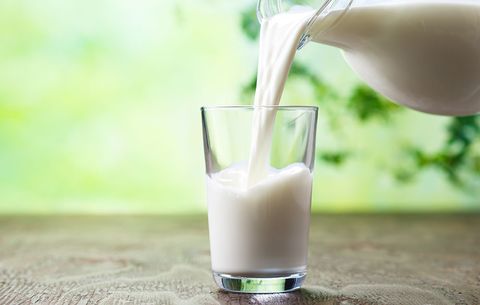
Getty Images
Good old-fashioned cow’s milk is a protein powerhouse. Plus, in addition to the high amount of protein you get per cup, “cow’s milk provides potassium, calcium, riboflavin, vitamin A, and vitamin B12,” says Elizabeth Shaw, R.D.N., and author of Fertility Foods.
Per 1-cup serving (low-fat): 101 cal, 3 g fat (1 g sat), 12 g carbs, 12 g sugar, 106 mg sodium, 0 g fiber, 8 g protein.
9. Seitan
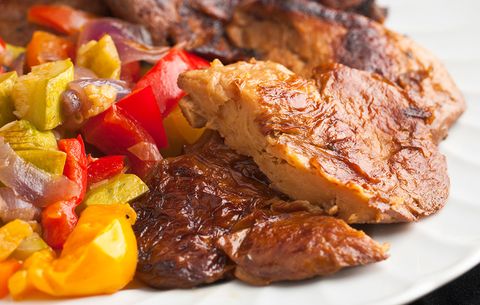
Getty Images
If you’re vegetarian and looking to try a low-carb, high-protein diet, seitan is your answer. “Made from wheat, seitan is the gluten protein that remains after wheat flour has been ‘washed,'” says Shaw. “You can use this in stir-fry, sandwiches and really, any meat-based recipe that you’re looking to turn vegetarian.” It does tend to be high in sodium, so be mindful of adding tons of extra salt or seasonings like soy sauce to it. And of course, if you have Celiac’s, steer clear.
Per 2.5-oz serving: 90 cal, 1 g fat (0 g sat), 4 g carbs (3 g net), 2 g sugar, 340 mg sodium, 1 g fiber, 17 g protein.
10. Edamame
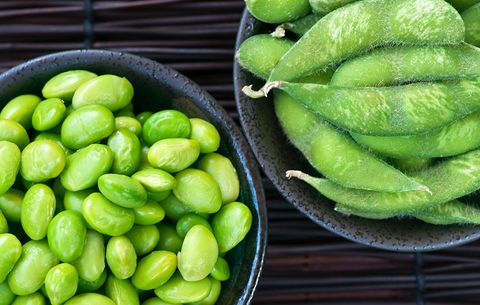
Getty Images
“There’s a reason this crunchy high-protein, low-carbohydrate snack is appearing all over the snack food aisle,” says Shaw. It’s packed with vegetarian protein and iron. You can easily toss this into a salad, stir-fry, or soup. “Brands like Seapoint Farms have even taken to packaging dry roasted edamame for a high-protein, convenient snack on the go,” she adds.
Per 1-cup serving: 188 cal, 8 g fat (1 g sat), 14 g carbs (6 g net), 3 g sugar, 9 mg sodium, 8 g fiber, 18 g protein.
11. Mozzarella Cheese
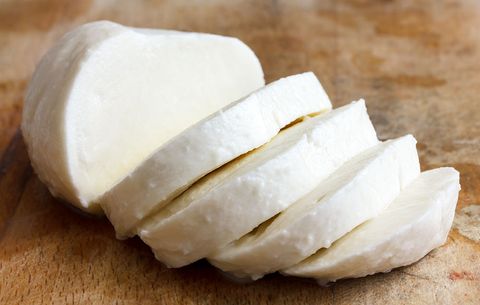
Getty Images
With tomato and basil, who can resist this high-protein, low-carbohydrate snack? “A one-ounce serving of mozzarella provides eight ounces of high-quality protein with only one gram of carbohydrates,” says Shaw.
Per 1-oz serving (part-skim): 72 cal, 5 g fat (3 g sat), 1 g carbs, 0.3 g sugar, 175 mg sodium, 0 g fiber, 7 g protein.
12. Almonds
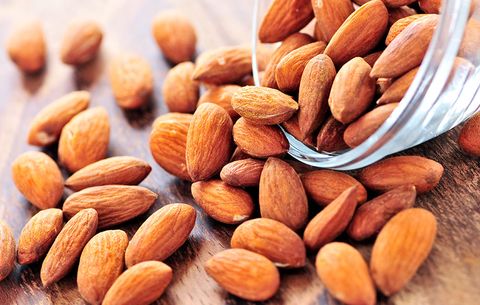
Getty Images
Along with pistachios, almonds make a great high-protein, low-carb snack. “Research suggests that eating nuts like almonds is linked to longer lifespan, less belly fat, improved brain health, and more,” says Moon. Here for allll of that.
Per 1/4-cup serving: 207 cal, 18 g fat (1 g sat), 8 g carbs (2 g net), 2 g sugar, 0 mg sodium, 5 g fiber, 8 g protein.
13. Deli Turkey Meat
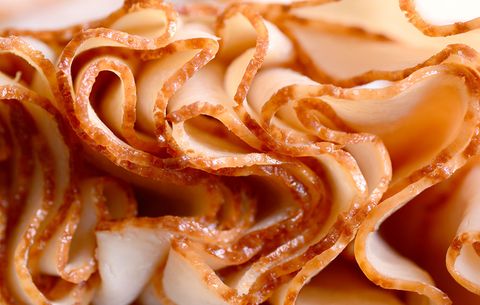
Getty Images
“Deli turkey makes an easy lunch or fast snack,” says Harris-Pincus. “Spread on one tablespoon of hummus and create roll-ups for an additional 25 calories, one gram protein, two grams of carbs, and one gram fiber,” she says. You can also try these deli turkey kebabs for lunch.
Per 2-oz serving: 62 cal, 0.5 g fat (0.1 g sat), 2 g carbs (1.7 g net), 2 g sugar, 440 mg sodium, 0.3 g fiber, 12 g protein.
14. Chia Seeds
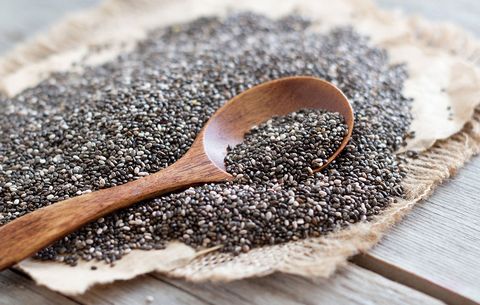
Getty Images
“Chia seeds are a secret weapon on any diet plan. They absorb about 10 times their weight in water, helping to keep you full,” says Harris-Pincus. What’s more, the high-protein food is also rich in healthy fats, like omega-3 fatty acids, which can lower inflammation. “Add them to smoothies, oatmeal, yogurt, cereal, and much more,” she says.
Per 1-oz serving: 138 cal, 9 g fat (0.1 g sat), 12 g carbs (2 g net), 2 g sugar, 5 mg sodium, 10 g fiber, 5 g protein.
15. Peanut Butter
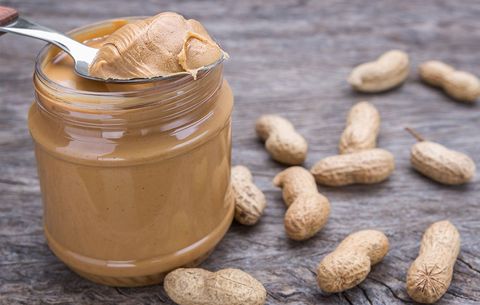
Getty Images
Here’s more reason to open up a jar of peanut butter for a low-carb, high-protein snack or pre-workout fuel. “Peanuts have the highest protein content among nuts,” says Harris-Pincus. And if you’re concerned about calories, try powdered peanut butter—which has comparable protein with way fewer calories.
Per 2-Tbsp. serving: 187 cal, 12 g fat (2 g sat), 13 g carbs (11 g net), 3 g sugar, 194 mg sodium, 2 g fiber, 10 g protein.
16. Pumpkin Seeds
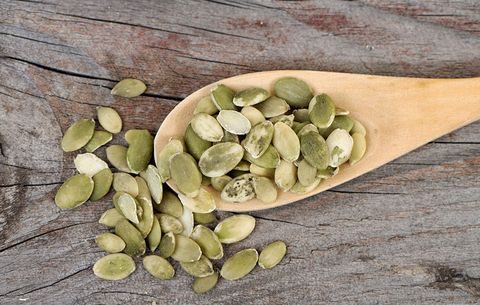
Getty Images
“Pumpkin seeds are fantastic with yogurt, cottage cheese, smoothie bowls, soups, and salads,” says Harris-Pincus. They are also a rich plant-based source of heart-healthy omega-3 fatty acids, too, much like those chia seeds.
Per 1-oz. serving (roasted): 163 cal, 14 g fat (2 g sat), 4 g carbs (2 g net), 0.4 g sugar, 5 mg sodium, 2 g fiber, 8 g protein.
17. Jerky
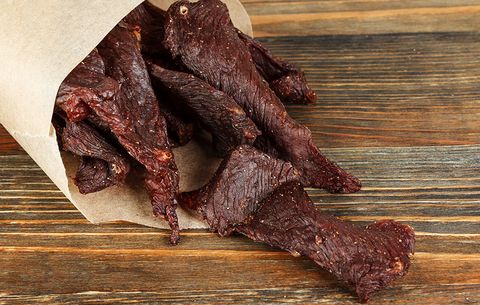
Getty Images
“Jerky is back as a portable snack with many trendy, flavored varieties on store shelves,” says Harris-Pincus—but not all are created equal. “The nutritional content varies widely depending on the brand and the flavor. Some are much higher in carbs and sugar than others,” says Harris-Pincus.
But if you find one that isn’t heavily sweetened (so, no teriyaki flavor!), you’ve got yourself a low-carb and high-protein snack.
Per 1-oz serving (beef): 116 cal, 7 g fat (3 g sat), 3 g carbs (2.5 g net), 3 g sugar, 506 mg sodium, 0.5 g fiber, 9 g protein.
18. Cottage Cheese
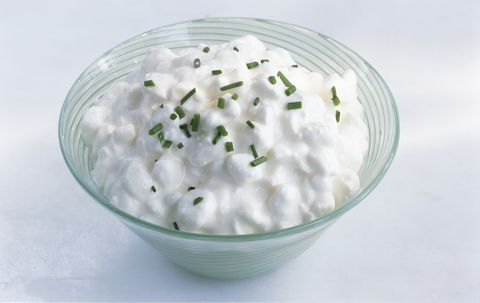
Getty ImagesMaximilian Stock Ltd.
“Cottage cheese is such a great way to boost your protein intake with very few carbs,” says Brooke Zigler, R.D.N. You can use it instead of yogurt as a topper for berries and granola, and you’ll have an easy, filling breakfast. “Cottage cheese is also a great swap for mozzarella cheese on homemade pizzas. By swapping for cottage cheese, you’re boosting the protein content and making it an even more filling meal,” she says.
Per 4. oz serving (low-fat, 2% milkfat): 92 cal, 3g fat (1g sat), 5g carbs (5g net), 5g sugar, 348mg sodium, 0g fiber, 12g protein
19. Tofu
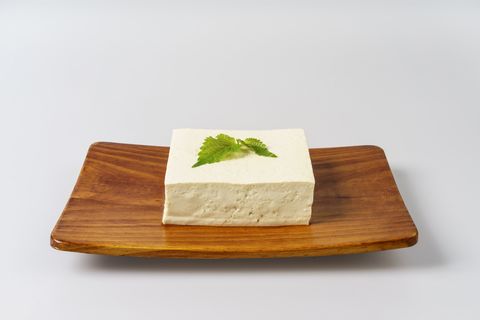
Getty ImagesTopic Images Inc.
Tofu is an inexpensive source of protein that is extremely versatile and can be a great alternative to meat. “It also has a longer shelf life, so it can be a great option to keep in the refrigerator for when you want a quick and easy protein for your meal,” says Zigler. Add to smoothies for additional protein, or use instead of eggs in a quick scramble.
Per ½ cup serving: 181 cal, 11g fat (2g sat), 4g carbs (1g net), 0g sugar, 18mg sodium, 3g fiber, 22g protein
20. Chicken
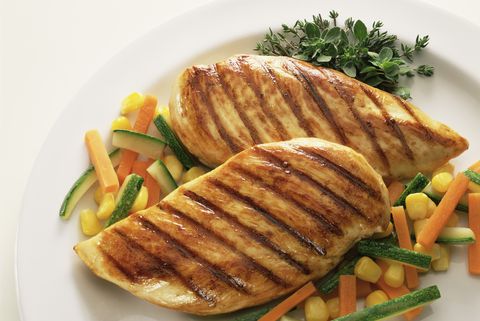
Getty ImagesCristina Cassinelli
“Skinless, chicken breast is one of my favorite sources of lean protein,” says Zigler. “It’s low in saturated fat compared with other meats, which can help someone maintain a healthy weight,” Add to salads and sandwiches, or eat plain or with some veggies as a meal or snack.
Per serving of 3 oz. chicken breast: 140 cal, 3g fat (0.9 g sat), 0g carbs (0g net), 0g sugar, 63 mg sodium, 0 g fiber, 26g protein
21. Artichokes
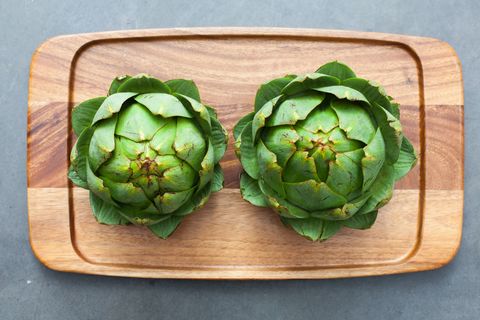
Getty ImagesBURGER/PHANIE
“Not only are artichokes loaded with the highest amounts of fiber of any vegetable, they also have four grams of protein per serving, making this a super filling vegetable,” says Zigler. Roast them with some oil and lemon or add to salads to boost satiety.
Per medium artichoke: 60 cal, 0g fat, 13g carbs (6g net), 1.3g sugar, 120mg sodium, 7g fiber, 4g protein
22. Hemp Seeds
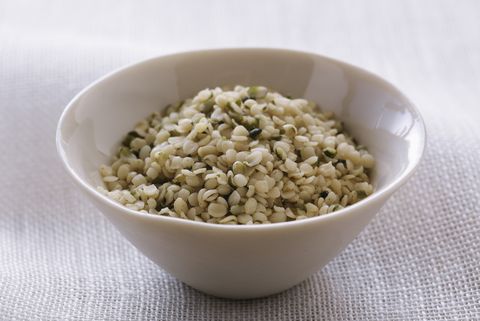
Getty ImagesJeff Kauck
“Technically a nut, hemp seeds are small but mighty when it comes to nutrition and protein,” says Maggie Michalczyk, R.D., and author of Once Upon a Pumpkin. “More than 25 percent of their total calories come from protein, and they’re a great addition to baked goods, salads, yogurt bowls, and more.” Hemp seeds are also a good source of phosphorus, magnesium, manganese, and iron, and they add a nice nutty, crunchy texture.
Per ¼ cup serving: 170 cal, 120 g fat (1.5 g sat), 3 g carbs (0 g net), less than 1 g sugar, 0 mg sodium, 3 g fiber, 10g protein
23. Grass-Fed Beef
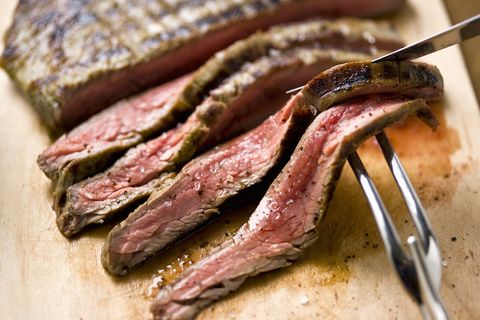
Getty ImagesAndrew Scrivani
“A great source of protein, grass-fed beef is higher in omega-3s fatty acids, and lower in total fat compared to other types of meat,” says Michalczyk. Opting for higher quality red meat, when available, is best. Pair it with nutrient-dense foods, like veggies.
Per 4 oz. serving: 157 cal, 7 g fat (3.1 g sat), 0 g carbs (0 g net), 0 g sugar, 72 mg sodium, 0 g fiber, 24 g protein
24. Broccoli
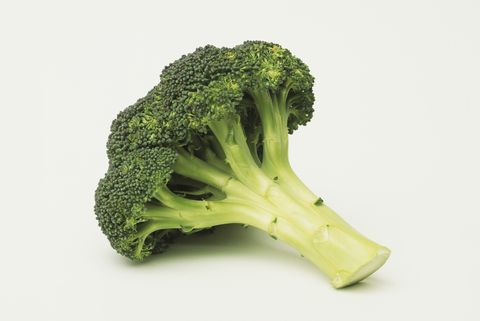
Getty ImagesAndy Crawford
This cruciferous veggie will definitely fill you up. “Believe it or not, broccoli ranks high on the protein list in terms of vegetables,” says Michalczyk. “Packed with antioxidants and fiber to boot, it’s definitely a powerhouse veggie you should aim to include a few times a week in dishes like stir fry or on the side of fish.”
Per 1 cup serving: 30 cal, 0 g fat (0 g sat), 5.8 g carbs (3.8g net), 1 g sugar, 30 mg sodium, 2 g fiber, 2.4g protein
25. Green Peas
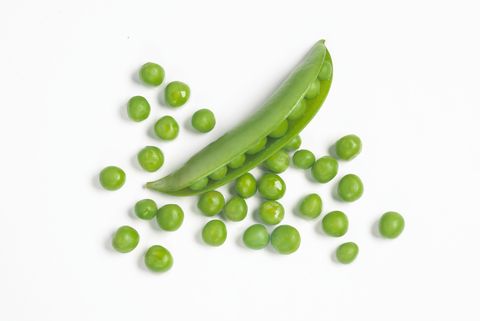
Getty ImagesBruno Crescia
“Peas are a good source of many vitamins and minerals as well as fiber and protein,” says Michalczyk. “While they do contain carbohydrates, they still rank high in terms of vegetables that contain protein.” If you’re trying to decrease carbs even further, simply lower the serving size and pair with another high-protein food.
Per ½ cup serving: 59 cal, 0 g fat (0 g sat), 10.5 g carbs (7 g net), 4 g sugar, 0 mg sodium, 3.5 g fiber, 4 g protein
26. Asparagus
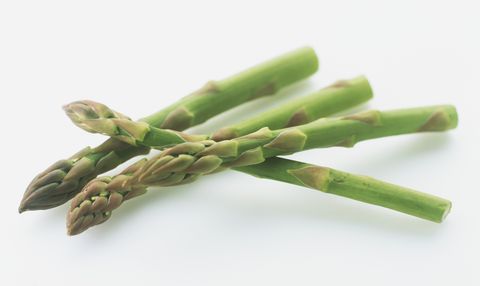
Getty ImagesIan O’Leary
“These vibrant green spears boast a long list of nutrients like vitamin K, antioxidants, and protein. Another higher-protein vegetable, asparagus is a great green to put on your weekly rotation more than just in the spring,” says Michalczyk. Grill them with some olive oil or cheese, or add to a stir-fry with meat or tofu.
Per ½ cup serving: 27 cal, 0 g fat (0 g sat), 5 g carbs (2.2 g net), 2.5 g sugar, 3 mg sodium, 2.8 g fiber, 3 g protein
Source: Read Full Article



